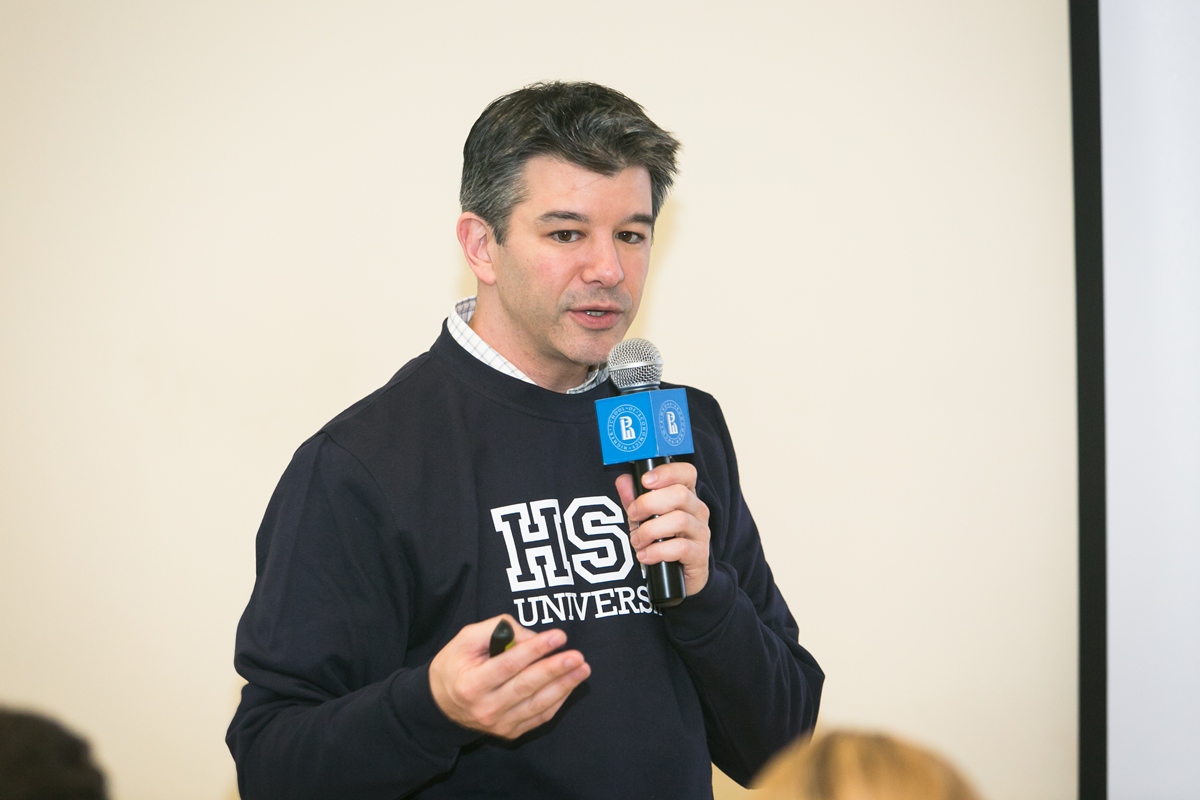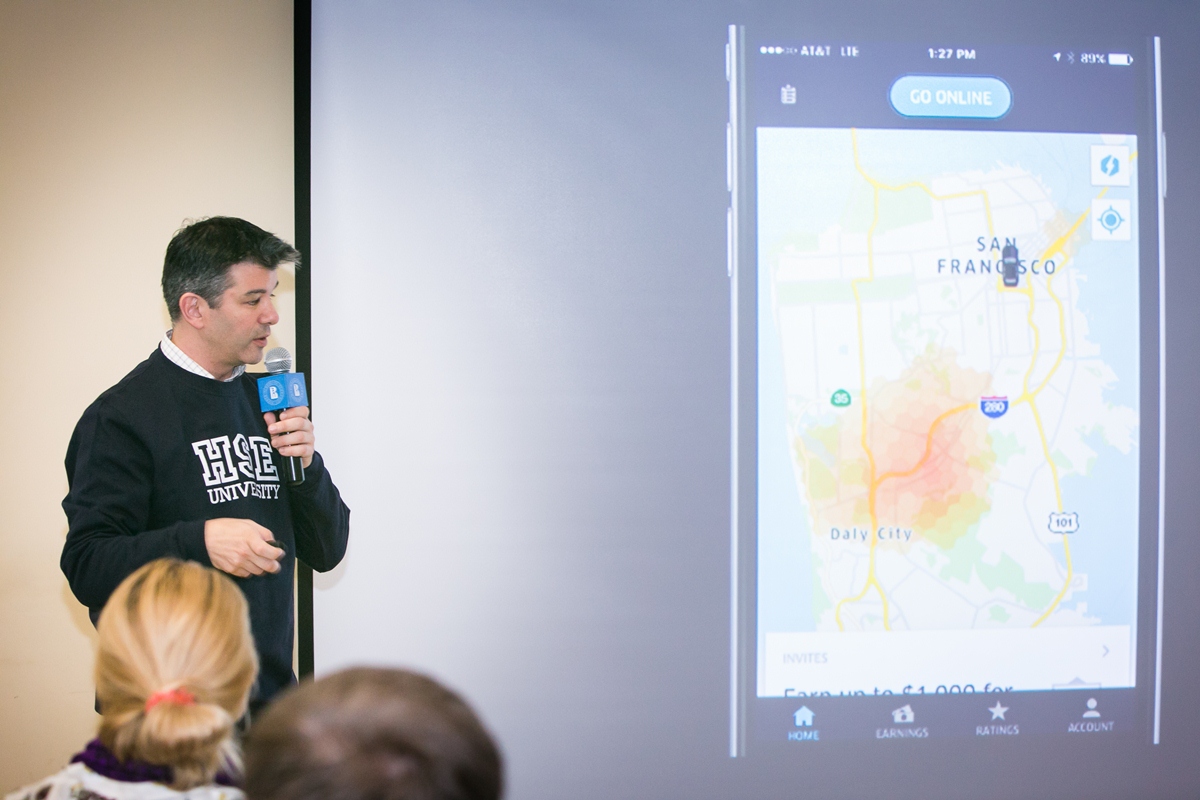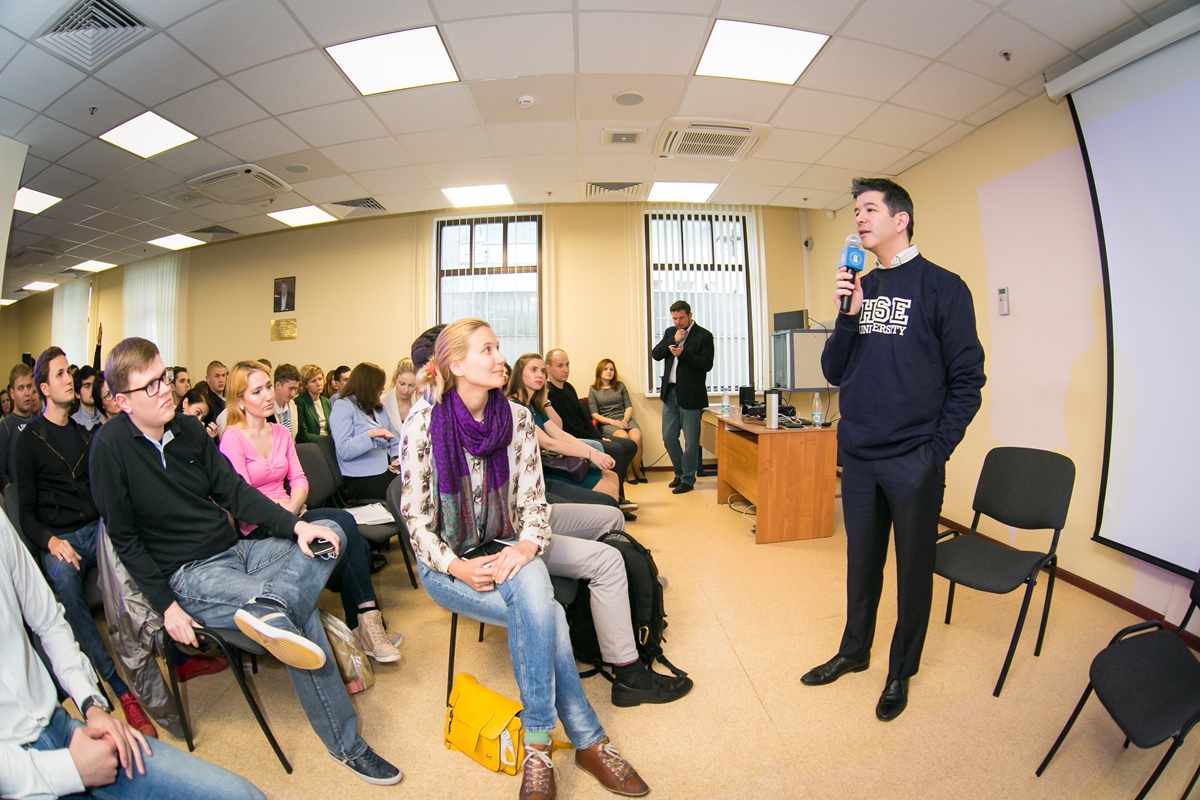How Geek Can Become Entrepreneur: Advice from Uber Founder

Travis Kalanick, founder and CEO of Uber, met some HSE students and told them what qualities a successful entrepreneur should have and why there is space for magic in business.
Find something broken
We were in Paris once and couldn’t find a taxi. I thought: it would be great if you could press a button and a car came immediately to any point of the city. This is how Uber started.
What was ‘broken’ in this case? The transportation organization system. Why? Because to become a taxi driver in big cities in developed countries, you have to get a licence, and their number is limited. In New York, the number of taxi licences has stayed almost the same during the last 70 years, and the price of a licence has become very high. Taxi operators charge the drivers $140 a day for the use of a licence. The system works so badly that the drivers often struggle to make ends meet. No new jobs are created in this sphere, and moving around the city becomes harder and more expensive.
We saw this problem and wanted to change it. It was interesting for us geeks to find a solution for it, not only in our city, but all over the world, not only for the rich, but for everyone. We wanted to make transportation as reliable and affordable as the public water supply.
Determine how difficult the problem is
The difficult part was not to create an app; everyone makes them today. The difficulty was to have a free car in five minutes from any user who decides to use our service. We had to learn to predict the situation: what will happen on the roads in half an hour? Where is each of our cars located at any given moment? Our drivers get this information as a heat map. They see where the demand for their service is higher, where more cars are needed, and where there is less work.
The next task was to teach the computer system to see the streets as multidimensional (with pavements, parking signs, trash cans, and other objects). This was a difficult task. I always tell my engineers that tasks like this require imagination.

Analyze, but be creative
These roles can be split between different partners in the project, but the best entrepreneurs combine both of these qualities, analytical and creative. This is how our brain works, the left hemisphere being responsible for analysis, and the right one for imagination and new ideas. Have fun and enjoy solving problems.
And it’s not necessary to solve them with traditional tools; you can invent something new. Children in the U.S. run after ice cream trucks. And we invented such a thing for adults: once a year you press a button and an ice cream truck comes to you. It’s a great idea, but it demanded solving some complicated logistical tasks. Analysis is needed to make magic happen.
Distinguish reality and the notion of reality
Generally accepted ideas about something can correspond with the real state of things, but can sometimes be very different from it as well. The gap between the notion and the reality is the game field for the innovator. If you know for sure that the reality is not where most of the people believe it to be, you have great opportunities. But if you’re mistaken, the game field becomes hell.
Einstein once said that the person who follows the crowd will usually go no further than the crowd, and those who walk alone are likely to find themselves in places no one has ever been before. If you want to do something new, to make the impossible possible, you shouldn’t chase after other people. You have to do something that other people will see as foolish, absurd, and crazy. And at the same time, a good entrepreneur must understand what risks they are taking. Before Uber, I had several companies, and they were small, and I was poor. I didn’t have a salary in the last company for four years, and I heard ‘no’ a hundred times a day during the four years. That was not easy.
Make magic
In the film ‘Pulp Fiction’, there is a strange briefcase that attracts everyone’s attention. One glance at it, and a person can’t think about anything else anymore. To be an entrepreneur means creating things that enchant people and their imagination. At Uber, we talk about four dimensions of magic: time (find a way to give back to people the time that they were losing before, without your product or service), calm (bring calm to their daily lives), joy (bring people joy and fun), and money (for example, Uber drivers get incomes that help them provide for their families, and the passengers pay less for transportation).
And magic should be ahead of time. Making magic is creating things that no one has seen before, and that will be in demand not only today, but also in the future.

Learn to sell your story
Engineers often disregard sellers and marketing managers and don’t want to work with them. But it’s very important to learn to sell what you’ve invented. If you don’t learn to tell your story, no one would learn about your idea, not matter how incredible it is. On Cinco de Mayo, our clients can order a mariachi band to entertain friends or colleagues, and this is also a subtle way to tell those who don’t know about Uber.
Think as a champion
As a real champion athlete, give away all of your strength and emotions on the field, and don’t get knocked down in hard times. If you truly do this, you won’t fail.
One last piece of advice: how to make a team
I’m often asked how we select engineers. I once answered: how do you select who you are going on a date with? Speaking seriously, in order to make a team, look through CVs, search online, go where engineers hang out, say hello and talk to them. Be patient and persistent.
See also:
‘The Future Is Already Here, but It Is Not Evenly Distributed’
On May 27, the Day of Russian Entrepreneurship, HSE University’s Cultural Centre hosted HSE Business Club, an annual student entrepreneurial forum. Three years ago, the HSE Business Club initiative group opened the forum as a platform for entrepreneurs to exchange experiences. Now it is the largest student business forum in the CIS. This year, a record number of 1,900 guests registered for the event.
Faculty of Computer Science Holds its First Entrepreneurship School
At the end of August, the Centre for Internships, Projects and Entrepreneurship of the Faculty of Computer Science, with support from the HSE University Business Incubator, held the first summer school on entrepreneurship. More than 40 HSE University bachelor’s and master’s students participated in it. The school was aimed at developing the students’ entrepreneurial skills and introducing them to the art of presenting ideas and products.
Applications Now Open for New Educational Robotics Accelerator
Over the course of 12 weeks, participants of the HSE Business Incubator’s programme will finalise their startups under the leadership of renowned market experts and attract grant funding for their projects. The programme will be held both online and in person. Applications for the accelerator are open until May 28, 2022.
Gifts under the Christmas Tree: How Student Startups Can Surprise You
One of the most popular minors that HSE University students can choose in their second and third years is 'Startup from Scratch'. With the teachers’ support, students launch their own business projects, including startups for the production and sale of souvenirs and cosmetics, which can serve as unique New Year gifts.
HSE Business Club Holds Its First Entrepreneurial Forum
This event was timed to coincide with Russian Entrepreneurship Day, which is celebrated on May 26. Forum attendees included not only students of HSE University, but also students from other Moscow universities. They were able to learn about internships in forum partner companies, as well as interacting in person with successful Russian business businesses.
‘We Want the Students to Experience Real Project Work’
Contemporary universities are becoming not only centres for education and research, but also hubs for entrepreneurship. Igor Agamirzian, HSE Vice President, Head of the Department for Management of Innovation, spoke about the development of the HSE’s innovation infrastructure, about attracting students to technological business projects, and about the master’s programme ‘Corporate Research, Development and Innovation Management’.
HSE to Help Develop Legislature to Boost Technology Entrepreneurship
Artem Kritsyn, Manager of regional programmes and projects at the HSE Business Incubator, now heads the Working Group to Involve Secondary and Higher School Students in Entrepreneurship. The Working Group was created in October 2017 by the Expert Council on the Development of Civil Education and Student Socialization under the State Duma Committee for Education and Science. The Working Group also includes Tatyana Stroganova, Head of the HSE Innovation and Enterprise Office.
HSE’s Nizhny Novgorod Campus to Help RAS Institute of Applied Physics to Market its Developments
The HSE Centre of Entrepreneurship in Nizhny Novgorod has started working in close cooperation with the Russian Academy of Sciences Institute of Applied Physics (IAP) for the purpose of commercializing the latter’s research results. The Centre will help IAP’s scholars market their projects.
Entrepreneurship is About More than Just Money
On September 14 2015, Dr Alina Sorgner will give a talk at the annual meeting of the HSE Laboratory for Entrepreneurial Research on 'Does Entrepreneurship Pay? Empirical Analysis of Incomes of Self-employed, as Compared to Wages of Paid Employees'. Ahead of her visit to HSE Moscow, the young academic gave an interview to HSE English News Service about variations in entrepreneurship in post-communist countries and about her cooperation with HSE.
The Future of Business Depends on Developing Countries
The 6th International Summer School ‘Exploring Entrepreneurship’ in Moscow has come to an end. At the school, students from Russian, Dutch, British and other European universities tried to identify the main factors that will influence the future development of small and medium-sized businesses around the world.


